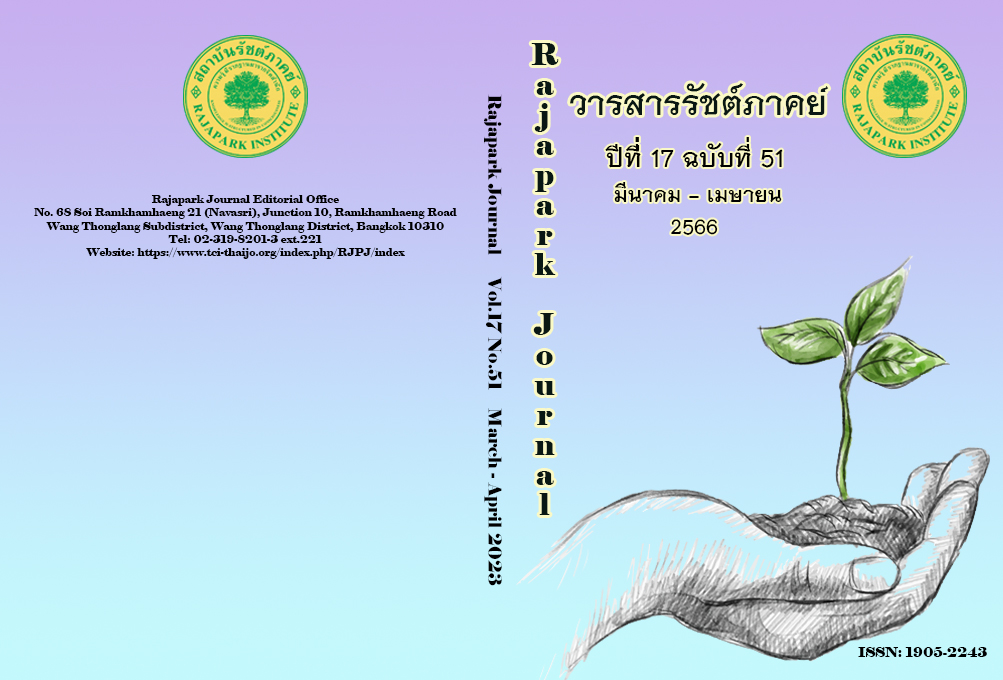A Casual Relationship Model of Museum Visitor Satisfaction in Bangkok
Main Article Content
Abstract
Nowadays, museums are not only a place for collecting and displaying social and cultural artifacts, but they are also a place that can create fun and memorable experiences that can lead to visitor satisfaction by using various types of smart tourism technology. Hence, the objectives of this research article were to develop a model of casual factors affecting museum visitor satisfaction and check the consistency of the model with empirical data. The sample of this research consisted of 400 visitors, who visited museum in Bangkok, answered questionnaires that were used as a research tool. The reliability of questionnaires was between.890 and .912. The data analysis consisted of descriptive statistics, such as frequency and percentage. All hypotheses were tested using structural equation modeling. Results revealed that the structural model of museum visitor satisfaction in Bangkok was consistent with empirical data. The factors in the model can together explain 80% of the variance in visitor satisfaction. In conclusion, perceived smart tourism technology has a positive direct and indirect effect on museum visitor satisfaction by creating a memorable tourism experience as a mediator variable. Additionally, memorable tourism experiences also have a positive direct effect on museum visitor satisfaction.
Article Details

This work is licensed under a Creative Commons Attribution-NonCommercial-NoDerivatives 4.0 International License.
Views and opinions appearing in the Journal it is the responsibility of the author of the article, and does not constitute the view and responsibility of the editorial team.
References
Anggraeni, R. (2019). Enhancing the revisit intention of nature-based tourism in Indonesia: The role of memorable tourism experience and satisfaction. Management and Business Research Quarterly, 11, 9-19. DOI:10.32038/mbrq.2019.11.02
Antón, C., Camarero, C., Laguna, M., & Buhalis, D. (2019). Impacts of authenticity, degree of adaptation and cultural contrast on travellers’ memorable gastronomy experiences. Journal of Hospitality Marketing & Management, 28(7), 743-764.
Azis, N., Amin, M., Chan, S. and Aprilia, C. (2020). How smart tourism technologies affect tourist destination loyalty, Journal of Hospitality and Tourism Technology, 11(4), 603-625.
Buhalis, D., & Amaranggana, A. (2015). Smart tourism destinations enhancing tourism experience through personalisation of services. In Information and communication technologies in tourism 2015 (pp. 377-389). Springer, Cham.
Chan, J.K.L. (2013). The Consumption of Museum Service Experiences: Benefits and Value of Museum Experiences. Journal of Hospitality Marketing & Management, 18(2-3), 173-196. https://doi.org/10.1080/19368620802590209
Cochran, W.G. (1977). Sampling Techniques (3rd ed.). John Wiley & Sons.
Cronbach, L.J. (1990). Essentials of psychological testing (5th ed.). Harper Collins.
Davis, D. (1996). Business Research for Decision Making (4th ed). Wadsworth.
Elshaer, A. M., & Marzouk, A. M. (2022). Memorable tourist experiences: the role of smart tourism technologies and hotel innovations. Tourism Recreation Research, 1-13.
Hair, J.F., Black, W.C., Babin, B.J. & Andrson, R.E. (2010). Multivariate Data Analysis (7th ed.). Prentice-Hall.
Huang, C. D., Goo, J., Nam, K., & Yoo, C. W. (2017). Smart tourism technologies in travel planning: The role of exploration and exploitation. Information & Management, 54(6), 757-770.
Jeong, M., & Shin, H.H. (2020). Tourists’ experiences with smart tourism technology at smart destinations and their behavior intentions. Journal of Travel Research, 59(8), 1464-1477.
Kerstetter, D., & Cho, M. (2004). Tourists’ information search behavior: The role of prior Knowledge and perceived credibility. Annals of Tourism Research, 31(4), 961-985.
Kim, J. H., Ritchie, J. R. B., & McCormick, B. (2012). Development of a scale to measure memorable tourism experience. Journal of Travel Research, 51(1), 12-25.
Kotler, P., & Armstrong, G. (2010). Principles of marketing. Pearson education.
Kumkrua, M., & Chokchaisiri, J, (2019). The Development of the Android Application for Working Support in Muang Kanchanaburi Subdistrict Municipality Administration. Journal of Science & Technology, Ubon Ratchathani University, 21(2), 189-197.
Limpinan, P. (2019). Promoting Mahasarakham Tourism by using Augmented Reality. Journal of Technology Management Rajabhat Maha Sarakham University, 6(1), 8-16.
Marinao, E. (2018). Determinants of Satisfaction with the Tourist Destination. Mobilities, Tourism and Travel Behavior-Contexts and Boundaries. DOI: 10.5772/intechopen.70343
Pai, C. K., Liu, Y., Kang, S., & Dai, A. (2020). The role of perceived smart tourism technology experience for tourist satisfaction, happiness and revisit intention. Sustainability, 12(16), 6592.
Schumacker, R.E., & Lomax, R.G. (2016). A Beginner’s Guide to Structural Equation Modelling (4th ed). Routledge.
Stavrianea, A., & Kamenidou, I.E. (2021). Memorable tourism experiences, destination image, satisfaction, and loyalty: an empirical study of Santorini Island. Euromed Journal of Business, 17(1), 1-20. DOI:10.1108/EMJB-10-2020-0106
Suksawang, P. (2014). The Basics of Structural Equation Modeling. Princess of Naradhiwas University Journal, 6(2), 136-145.
Torabi, Z.A., Shalbafian, A.A., Allam, Z., Ghaderi, Z., Murgante, B., & Khavarian-Garmsir, A.R. (2022). Enhancing Memorable Experiences, Tourist Satisfaction, and Revisit Intention through Smart Tourism Technologies. Sustainability, 14(5), 2721.
Tourism Authority of Thailand. (2021). Tourism Trend in the Future. https://api.tourismthailand.org/upload/live/content_article_file/20603-15378.pdf
Um, T., & Chung, N. (2021). Does smart tourism technology matter? Lessons from three smart tourism cities in South Korea. Asia Pacific Journal of Tourism Research, 26(4), 396-414.
Yang, X., & Zhang, L. (2022). Smart tourism technologies towards memorable experiences for museum visitors. Tourism Review, 4, 1009-1023.
Zhang, Y., Sotiriadis, M., & Shen, S. (2022). Investigating the Impact of Smart Tourism Technologies on Tourists’ Experiences. Sustainability, 14(5), 3048.


